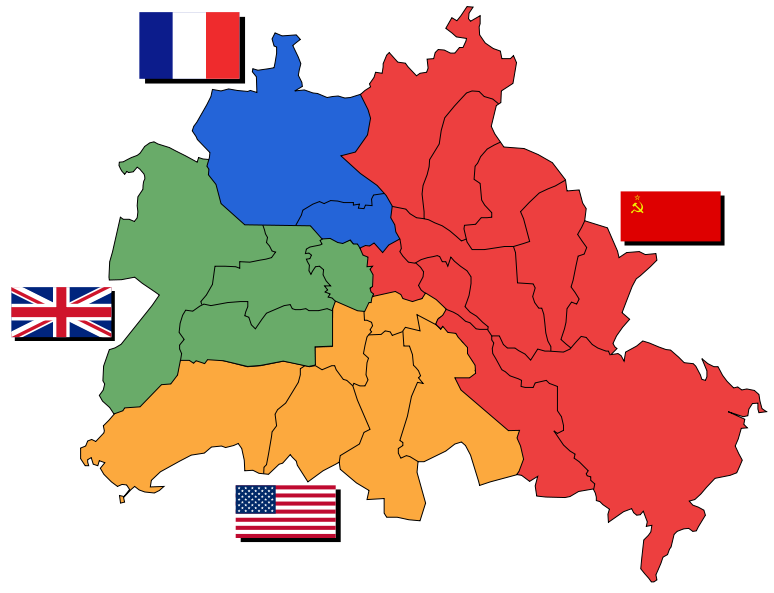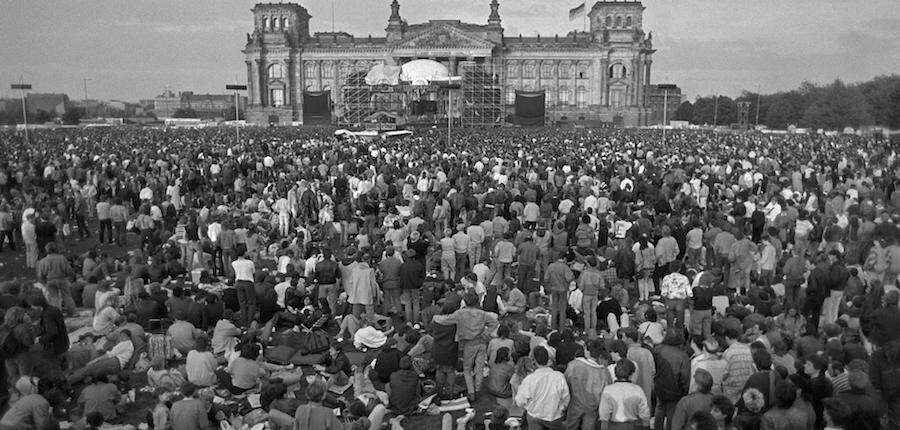How Bowie Helped Bring Down The Berlin Wall
In June 1987, a three-day concert was held in front of the Reichstag in West Germany with a lineup including David Bowie, The Eurythmics & Genesis. In November 1989 the Berlin Wall fell. But why are the two events connected? Did a concert help bring down the Berlin Wall?
Berlin Airlift
The fall of the Berlin Wall is one of the most famous and pivotal scenes of recent history - leading to the end of the cold war, the fall of the Soviet Union and becoming a symbol for freedom and the unification of people. To understand our concerts role, let’s have a quick recap of the history of the wall...
In 1945, after the second world war, the victorious allies came together to split Germany between them. East Germany went to the Communist Soviet Union, which immediately banned East Germans from leaving East Germany. While the West, which contained the industry of Germany, was split between the Capitalist, UK, U.S and France. Berlin was a complication. It was situated in the East, the Soviet part of the country, but the Western allies also wanted some control there, so it was also split into four sections. The Western half was divided between Britain, the US and France, whilst the Eastern half was controlled by the Soviets. This caused a problem, although East Germans were technically not allowed into West Germany, if you lived in the East part of Berlin, you could easily walk into West Berlin. And from West Berlin, people could then easily travel into West Germany. As the Capitalist West poured money into reforming their half of Germany (and Berlin), boosting the industry further, the Soviet Union took the remaining industry and resources from the already poor East back to Russia as war reparations. While there was free health care and education in the East, the West had higher salaries, a higher quality of life and more personal freedoms. This meant a lot of East Germans wanted to move to the West. As tensions grew between the Soviet Union and the U.S, the Soviet Union wanted Berlin as solely theirs. They decided to cut off land routes, food and fuel supplies to the West side of Berlin in an attempt to starve the West out. For 15 months, planes from the Western allies dropped off supplies into the Western sector in an event called the Berlin Airlift. Eventually, the Soviet Government backed off. Despite this, the West of Berlin continued to grow in wealth, while the industry starved East hit economic failure with little to no industry. By 1961 nearly 20% of the East German population had moved to the West in search of work, including many highly skilled and educated professionals. East Germany decided to close the border between East and West Berlin to prevent further losses and save the economy. They began work on the Berlin Wall.
Building of the Berlin Wall
The wall extended for 43km through Berlin, splitting up friends and family on either side. An additional 112km was built around the perimeter, surrounding West Berlin. Initially, a barbed-wire fence, by 1965, much of it was replaced by concrete barricades, strengthened by layers of land spikes, guard dogs and landmines and a 100m section of land dubbed the death strip. This area was cleared of buildings, covered in sand to provide a clear line of sight for the 302 watchtowers manned by snipers ordered to shoot anyone attempting to cross. One hundred and thirty-eight people were killed trying to escape into the West. The wall did stabilise the East German economy and as the poverty eased, so did restrictions, with some family visits being allowed. Despite this, many people were unhappy with the Communist Regime. As other communist countries turned to democracy in the 1980s, mass demonstrations began to break out across East Germany.
Hansa Studio 2
Now we have a little context. Let’s have a look at the music. Bowie knew West Berlin well. Having lived there for three years in an apartment with Iggy Pop in the late 1970s, Bowie felt Berlin was a retreat from his rockstar lifestyle. During his time here, he wrote and recorded three albums that became known as the Berlin Trilogy. In 1977 Bowie recorded ‘Heroes’, the second in the trilogy in Hansa Studio 2. The studio was a former concert hall used by Gestapo officers during World War II as a ballroom and converted into a recording studio after the war. Located Five hundred yards from the Berlin wall, Bowie described it as the “hall by the wall”, and this location had a profound effect on the music.
Bowies Music Producer Visconti recounted:
"Every afternoon I'd sit down at the desk and see three Russian Red Guards looking at us with binoculars, with their Sten guns over their shoulders, and the barbed wire, and I knew that there were mines buried in that wall, and that atmosphere was so provocative and so stimulating and so frightening that the band played with so much energy".
Guitarist Carlos Alomar who was also working on the album described the atmosphere.
"These things are hanging in the air, and when things get darker physically, you kind of think of darker themes too. Berlin was a rather dark, industrial place to work."
That year was a dark year for the Berlin wall as East German border guards shot and killed 18-year-old Dietmar Schwietzer as he tried to escape to the West and a few months later, 22-year-old Henri Weise drowned trying to escape by crossing the Spree River.
‘Hereos’ was an album drawn from the Cold War themes of fear and isolation that hung over the city. Its title track tells a story of two lovers who meet at the wall and try, hopelessly, to find a way to be together. Although this may have had a more personal meaning for Bowie, it became a symbol of the hopeless separation felt by Berliners.
Concert for Berlin
A decade later, in 1987, the Concert for Berlin was organised. By then, East Berlin had become much safer and wealthier but not freer. The Soviet leaders treated Western pop and rock as a threat that could spark a rebellion and destabilise the East. Despite this, a US-run radio station had become popular in the East and had permission to broadcast the entire show, and the show was situated close enough to the wall that it could be heard from the East side. It is not clear whether the concert was purposefully provocative, as some of the organisers claim it was not. However, the promotor Peter Schwenkow believes it was an act of revenge, saying:
"In 1977, some crew members of Tina Turner were killed while in transit through East Germany. A short time later, while in transit myself, I tried to find out what had happened and was interrogated at gunpoint by East German border guards. Ever since then, I couldn't stand those guys. Holding a show at the Reichstag was an attempt to provoke them. It was great fun."
Either way, six artists were invited to play. On the first night, New Model Army and David Bowie with his symbolic song ‘Heroes’. East Berliners crowded along the East side of the wall to listen. Before singing Hereos, Bowie began by telling the crowd, in German, "We send our wishes to all our friends who are on the other side of the wall." sending a clear message that this music was for the East as well as the West. Bowie later said, "It was one of the most emotional performances I’ve ever done. I was in tears,”
The next night, thousands of East Berliners turned up again to listen to Bruce Hornsby & the Range and The Eurythmics. But it was on the third night as Paul Young and Genesis played that the police had enough. They cordoned off a street a quarter of a mile from the Brandenburg Gate, where 2000 people had headed to listen. The crackdown was violent, police dragged concertgoers along the road, used water cannons and arrested 200 people.
East and West Berliners were outraged, with media from the West beginning to call to bring down the wall. Many saw this concert as the point that mood shifted against the state, feeling that the East German Authorities had turned a peaceful concert into a violent political act. East Berliners saw the wall with renewed outrage, and it began to be viewed as something less permanent than it had been thought of when Bowie had recorded ‘Heroes’ a decade earlier.
A week later, US President Ronald Reagan visited West Berlin. Standing in front of the Brandenburg Gate, the very place that concertgoers had wished to listen to music from, called on Soviet leader Mikhail Gorbachev to "tear down this wall."
So, did the Concert for Berlin help bring down the wall? The German Foreign Ministry certainly endorse this reading of history, tweeting on Bowie's death with a link to his performance of Hereos:
Good-bye, David Bowie. You are now among #Heroes. Thank you for helping to bring down the #wall.
From 1987, public opinion had begun to turn sour, and by 1989, mass protests broke out across the country. This was because of many reasons, the dismantling of other communist states, lack of freedoms and a public appetite for democracy. In the end, the Berlin wall came down when East Germany tried to defuse the mass protests by making travel permits easier to obtain. This was incorrectly announced as an immediate effect and caused a chain reaction. People started gathering at the walls, and news reports announced that the gates were now wide open even though they were not. Although guards initially tried to allow people through in an orderly fashion, too many turned up, and the guards opened the border. People began to celebrate and dance on the wall and later that night tore it down.
So, The Berlin Wall was brought down by political changes, a botched announcement and a change in public opinion. It’s hard to measure social change, but I like to think that this concert did help people understand they did not have to be separate. After all, music brings people together, and in the end, it was the people that tore down the wall.
References
The Berlin Wall: https://en.wikipedia.org/wiki/Berlin_Wall
The Berlin Wall TedEd: https://www.youtube.com/watch?v=A9fQPzZ1-hg&t=82s
The Mistake That Toppled The Berlin Wall: https://www.youtube.com/watch?v=Mn4VDwaV-oo&t=80s
The Concert That Rocked: https://www.bbc.co.uk/programmes/w3csyww1
Bowie and The Berlin Wall: https://www.wearethemighty.com/music/david-bowie-berlin-wall/
IF YOU HAVE ANY QUESTIONS PLEASE GET IN TOUCH OR BOOK A SINGING LESSON HERE.







